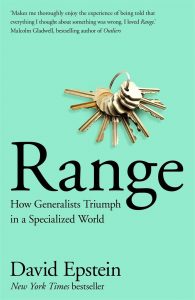
Early specialization is not mandatory to achieve excellence.
In a world that is more aggressively competitive, we often think that more specialization is the key to achieving success. But David suggests that ditching a head start for developing range works as well, pointing out to Roger Federer who gave a shot at several different sports before picking tennis. It’s never bad to sample your skillset.
>Jack of all trades
Having a wide range of experience in your arsenal will increase your likelihood of success wherever life takes you. Possessing a broad field of experience is associated with being more innovative.
>Need for lateral-thinking generalists
David suggests that modern business requires knowledge transfer: the skill to apply conceptual knowledge of elsewhere to entirely new situations and different fields. He also argues that education should encourage critical intelligence, instead of overspecialization.
>True learning happens in practice, not in theory
Stop offering major hints and suggestions. Allow people to be wrong and mistakes. You are not learning anything if it’s easy. Make it challenging. The process of learning is slow. Performing poorly now is critical for better performance later.
>Don’t be afraid to quit
There is a huge stigma behind quitting. Quitting isn’t always an acceptance of failure. Sometimes it is the recognition of better opportunities. David suggests that exploring and switching are necessary at times. It is after doing should you be concerned about specializing. Keep an open mind. There is always something you can gain from every experience.
# Key Takeaways from Range:
– The importance of having a broad range of experiences and skills, rather than specializing in one specific area.
– The benefits of being a generalist, including adaptability, creativity, and problem-solving abilities.
– The idea that early specialization can limit one’s potential and lead to burnout.
– The concept of “match quality” and how it relates to finding the right career path.
– The role of deliberate practice in developing skills and expertise.
– The importance of embracing uncertainty and taking risks in order to discover one’s true passions and talents.
# Practical Application of Range:
– Encourage individuals to explore a variety of interests and experiences, rather than focusing solely on one area.
– Encourage a diverse team with a range of skills and backgrounds, rather than hiring only specialists.
– Provide opportunities for deliberate practice and continuous learning in the workplace.
– Encourage employees to take risks and try new things, rather than sticking to a specific job or role.
– Use the concept of “match quality” to help individuals find the right career path and make career decisions.
# Valuable Insights for Leaders and Managers:
– Chapter 1: “The Cult of the Head Start”
– This chapter discusses the dangers of early specialization and the benefits of a broad range of experiences.
– Chapter 3: “How to Think, and How to Live”
– This chapter explores the importance of being a generalist and the benefits it can bring to leadership and decision-making.
– Chapter 6: “Learning, Fast and Slow”
– This chapter delves into the concept of deliberate practice and how it can be applied in the workplace to develop skills and expertise.
– Chapter 8: “The Trouble with Too Much Grit”
– This chapter challenges the popular notion of “grit” and discusses the importance of embracing uncertainty and taking risks.
– Chapter 9: “Flirting with Your Possible Selves”
– This chapter encourages individuals to explore their passions and talents, rather than being limited by their current skills and experiences.
# Case Studies and Examples in Range:
– The story of Roger Federer and his unconventional path to becoming a tennis champion, despite not specializing in the sport at a young age.
– The success of Pixar, a company that values diverse experiences and backgrounds in their employees, leading to innovative and successful films.
– The story of David Epstein himself, who went from being a sports writer to a science writer, showcasing the benefits of a broad range of skills and experiences.
– The example of the “dark horse” candidate, who may not have the traditional qualifications for a job, but brings a unique perspective and skill set to the role.
– The story of the “late bloomer” who may not have found their true passion or talent until later in life, but ultimately achieved great success.
Leave a Reply